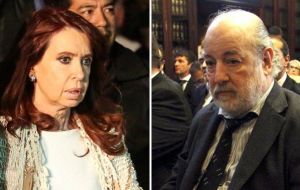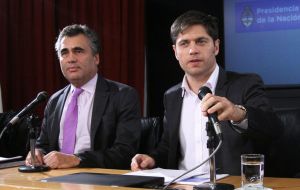MercoPress. South Atlantic News Agency
The US dollar curse has Cristina Fernandez on the edge of a public trial
 Ex president Cristina Fernandez and Federal Judge Claudio Bonadio
Ex president Cristina Fernandez and Federal Judge Claudio Bonadio Former Argentine president Cristina Fernandez was prosecuted on Friday for fraudulent administration in detriment of the Argentine state in the so called “dollar futures' ”case, including the seizure of 15 million Pesos in assets equivalent to a million dollars.
The Buenos Aires Federal Chamber II also confirmed the prosecution and similar seizure of former Economy minister Axel Kicillof, ex Argentine central bank chairman Alejandro Vanoli as well as the other twelve members of the board at the time of the case.
With this latest ruling Federal Judge Claudio Bonadio can consider the investigation concluded and can move on to the next step which is an oral trial of the alleged culprits. However this latest decision can be appealed before the Federal Cassation Chamber, which is the last resort in Argentine penal cases.
According to the resolution published by the Judicial Information Center, CIJ, there is “enough evidence” to sustain that in effect Fernandez and Kicillof “were most central in the decision to proceed to defraud the assets of the Central Bank.”
Federal Judge claims that when Cristina Fernandez was president she was responsible for bolstering the Central bank into selling dollars in the futures market at a low price, and thus caused with that operation strong losses to the bank.
The defense of the ex president argued that those who purchased dollars in the futures market were business people, most of which are today members of the government of president Mauricio Macri, and all of them were authorized by Federal Judge Bonadío to cash those operations.
The dollar futures market is a short term investment in the US currency. If the rate Dollar/Peso drops the Central bank gains, but in the opposite situation winners are the investors. And in effect when Macri took office he let the exchange rate float freely which resulted in a 32% devaluation of the Argentine peso against the US dollar.
Last May, Bonadío decided the prosecution of the ex president but her defense rejected the claim arguing that the Central bank is totally independent from the control of the Executive branch.
Both Kirchner followers and the ex president have repeatedly rejected the Macri administration's accusations, claiming the end objective in supporting the investigation and trial was to have Cristina Fernandez sent to jail, in a clear demonstration of political persecution.
The Federal chamber in its ruling said that both sides, accusers and defendants, agree in one point and that is that there was a colossal fraud with public monies, and the dissidence rests in who is responsible for the action which is reciprocally attributed.





Top Comments
Disclaimer & comment rules-

-

-

Read all commentsShe's going to jail.
Nov 12th, 2016 - 03:54 pm +5They thought they were above the law.
Nov 12th, 2016 - 01:11 pm +4“....an oral trial...”
Nov 12th, 2016 - 02:48 pm +3Sometimes called a hearing but in these cases it's a “trial” by three judges. If you think you're going to see a trial by jury/peers in this country, you're screwed.
“....Federal Cassation Chamber, which is the last resort in Argentine penal cases....”
Cassation court is a relatively new high-level appeals court here but they are limited to determining whether or not the law has been correctly applied. They don't examine the evidence or similar substance of a case. There are four “instances” for appeals here and Cassation appears between the traditional appeals court and the supreme court. It's unclear whether Cassation would be the last available means for appeal here since the federal supreme court remains available for reviewing and overturning Cassation findings if there is a basis for “recurso extraordinario” - sometimes called Extraordinary Appeal.
“...her defense rejected the claim arguing that the Central bank is totally independent from the control of the Executive branch...”
That is just soooooo very funny. But the judiciary in the US was stupid enough to believe it in another case, or at least made public representations that they believed it. Just because Argentina said that the central bank was independent of the Kirchner government, didn't make it so.
Commenting for this story is now closed.
If you have a Facebook account, become a fan and comment on our Facebook Page!